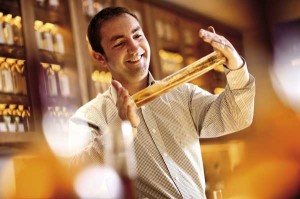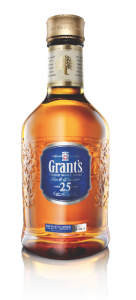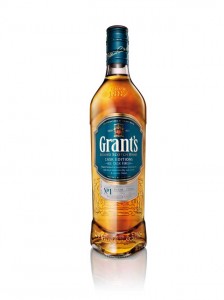By Richard Thomas
Among the various whiskey company brand ambassadors, few have quite the same presence as online Grant’s Ludo Ducrocq. His blog at Grant’s is among the busiest on the official, commercial side of the whiskey trade, and Ducrocq is especially well-known for sampling Grant’s old and discontinued expressions and reporting back on them. The Whiskey Reviewer was recently able to interview Ducrocq about Grant’s and his own personal tastes in whiskey.
RT: Grant’s is one of the big boys in blended Scotch whisky. What sets the Grant’s line apart from peers like Ballantines, Cutty Sark or Johnnie Walker?
LD: Grant’s is indeed the most popular family-owned Scotch whisky. It’s also the oldest family-owned blended whisky.
Unusually, William Grant started his whisky venture as a malt distiller and only later became a blender. Many of today’s famous brands like Johnnie Walker and Ballantine’s were first blended by successful grocers who subsequently acquired their own distilleries.
Grant’s was first blended in William’s hometown – Dufftown in the Speyside region. Perhaps unsurprisingly, he chose to create a blend which would capture the style of the Speyside region and it is exactly what our 6th Master Blender aims to produce today; a rich, sweet, honeyed and fruity blended whisky, with a slight hint of peat.
As well as our signature expression, called The Family Reserve, we have a range of unique blends such as Grant’s Ale Cask, the only Scotch whisky matured in beer casks; and Grant’s 25 Years Old, which contains whisky from closed distilleries such as the Ladyburn lowland distillery.
RT: Let’s say you were talking to an American bourbon drinker about your Scotch. What qualities does the Grant’s line have that might appeal to him?
LD: There are indeed similarities between both types of whisky (if I grossly generalise). First and foremost, a whisky like The Family Reserve is matured in ex. American whiskey casks, many of them ex. Bourbon casks. Therefore many flavours such as honey, toffee or vanilla will be present in both our blends and the vast majority of Bourbon whiskies.
Furthermore, Scotch blends are made of both malt and grain whiskies. Single grain Scotch whiskies are, like Bourbon whiskies, made from a variety of cereals such as wheat and barley, and in one case, maize (or corn as it’s called in the US).
The distillation process of grain whisky is also similar to most bourbon whiskies – continuous distillation in column stills being used for both in most cases.
A key difference though will be the presence of peat. Whilst Grant’s is not a particularly peaty whisky, our blends do generally contain a small amount of smoky whiskies. This can be an interesting new flavour experience for a regular Bourbon drinker who is looking for something new.
But please don’t get me wrong! I like American whiskeys too and I would encourage everyone to have both Scotch and Bourbon whiskies in their bar at home. I certainly do!
RT: What does the near term future hold for the Grant’s line? Are there any new expressions in the works, or new experiments in blending and/or finishing?
LD: As family blenders we take a long-term view in our approach to innovation and you can be absolutely sure we are currently working on exciting projects. In fact, I hope we will be able to release one these experiments later on this year. But please don’t be disappointed if nothing comes out! As the name ‘experiment’ implies, we are never absolutely sure how these trials will turn out and we will not release any new expression until we are completely satisfied with it.
Furthermore we have a history of successful innovations which we are keen to continue. For example, in 2001 we became the first blenders to introduce the ‘finishing’ technique to some our blends like Grant’s Sherry Cask Edition. Whilst this method of transferring mature whisky from one type of cask to another was used by a few malt whiskies, we were the first to implement it with blended whisky.
RT: Could you tell us a bit about how you got into the whiskey business? What advice would you offer to a college student trying to break into it today?
LD: After graduating from university, I took a summer job at our Visitor Centre in Dufftown in 2000. Little did I know, this seasonal position quickly turned into a permanent role and after working on our malt whiskies, I became the Global Ambassador for Grant’s in 2009. This is my 13th year in the company.
The good news is more and more people are turning to Scotch whisky as their tipple of choice and this in turn creates new work opportunities within the industry. It’s difficult to give advice as there are a range of careers available in a company like ours. You could start as an apprentice cooper, work in sales, marketing, finance, legal, IT, distilling or even train to become a Master Blender. All of these jobs obviously require different skills but it is clear there are options for anyone who is seriously interested.
RT: What do you personally look for in an everyday sipping whiskey?
LD: If you follow me on twitter (@ludo1887), you may have noticed I taste new whiskies on an almost daily basis. I am fortunate to be in a position where I am often sent samples to review and these have gradually become my ‘everyday sipping whisky’. If I didn’t have this job, I guess I would be looking for something rich yet well-balanced and elegant. That’s what I look for when I buy wine.
RT: Of the Grant’s line, what is your favorite?
LD: I currently have a soft spot for Grant’s Ale Cask Edition. It’s the only Scotch whisky matured in beer casks and it has the perfect balance of sweetness, fresh fruits and floral notes. This may shock you but I love it served on a big ice cube. Besides, I am very proud of the fact we are able to sell it for under £20 per bottle. Some of our blends can fetch several thousand pounds a bottle and they of course excellent but realistically, only a minority of whisky enthusiasts can afford those. Ale Cask on the other hand is within reach of most whisky fans and it has a unique taste profile.
 The Whiskey Reviewer A World of Whiskey, Poured Every Weekday
The Whiskey Reviewer A World of Whiskey, Poured Every Weekday



